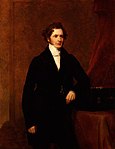
Back যুক্তরাজ্যের সাধারণ নির্বাচন, ১৮৪৭ Bengali/Bangla Elecciones generales del Reino Unido de 1847 Spanish Élections générales britanniques de 1847 French הבחירות הכלליות בבריטניה 1847 HE Elezioni generali nel Regno Unito del 1847 Italian 1847년 영국 총선 Korean Alegeri legislative în Regatul Unit, 1847 Romanian Парламентские выборы в Великобритании (1847) Russian Парламентські вибори у Великій Британії 1847 Ukrainian
| |||||||||||||||||||||||||||||||||||||||||||||||||
All 656 seats in the House of Commons 329 seats needed for a majority | |||||||||||||||||||||||||||||||||||||||||||||||||
|---|---|---|---|---|---|---|---|---|---|---|---|---|---|---|---|---|---|---|---|---|---|---|---|---|---|---|---|---|---|---|---|---|---|---|---|---|---|---|---|---|---|---|---|---|---|---|---|---|---|
| |||||||||||||||||||||||||||||||||||||||||||||||||
 Composition of the House of Commons after the election | |||||||||||||||||||||||||||||||||||||||||||||||||
| |||||||||||||||||||||||||||||||||||||||||||||||||
The 1847 United Kingdom general election was conducted between 29 July 1847 and 26 August 1847 and resulted in the Whigs in control of government despite candidates calling themselves Conservatives winning the most seats. The Conservatives were divided between Protectionists, led by Lord Stanley, and a minority of free-trade Tories, known also as Liberal Conservatives or the Peelites for their leader, former prime minister Sir Robert Peel. This left the Whigs, led by Prime Minister Lord John Russell, in a position to continue in government.[2]
The Irish Repeal group won more seats than in the previous general election, while the Chartists gained the only seat they were ever to hold, Nottingham's second seat, held by Chartist leader Feargus O'Connor.
The election also witnessed the election of Britain's first Jewish MP, the Liberal Lionel de Rothschild in the City of London. Members being sworn in were however required to swear the Christian Oath of Allegiance, meaning Rothschild was unable actually to take his seat until the passage of the Jews Relief Act in 1858. The constituency of Sudbury, which elected two members, was disfranchised for this election. This accounts there being two fewer seats in the House of Commons as compared to the previous election, though no redistribution took place.
- ^ Including Peelites.
- ^ White, Isobel; Durkin, Mary (15 November 2007). "General Election Dates 1832-2005" (PDF). House of Commons.
Cite error: There are <ref group=lower-alpha> tags or {{efn}} templates on this page, but the references will not show without a {{reflist|group=lower-alpha}} template or {{notelist}} template (see the help page).

